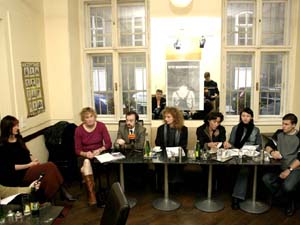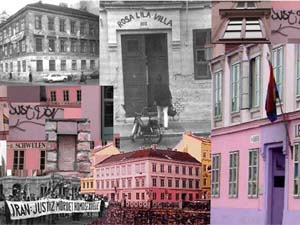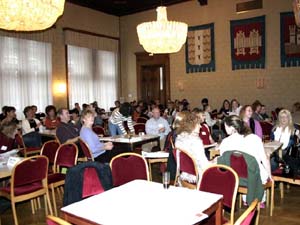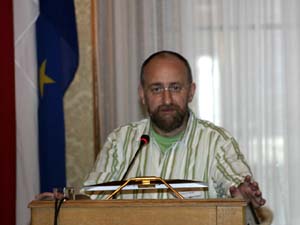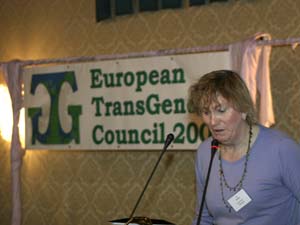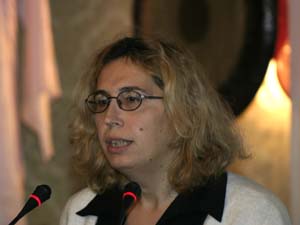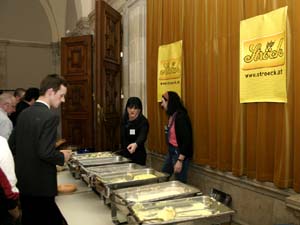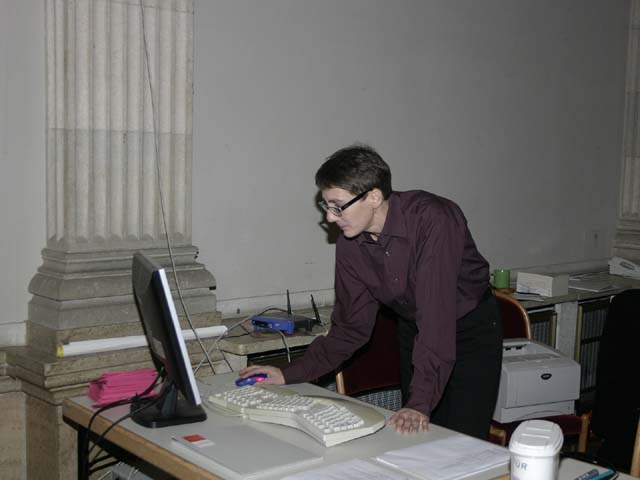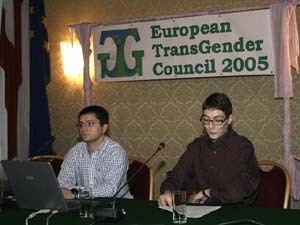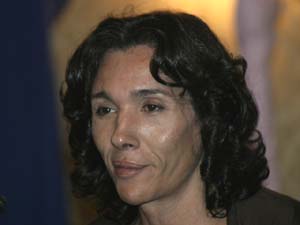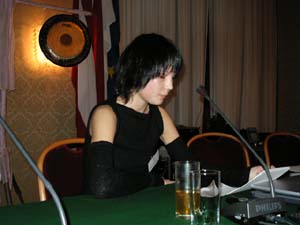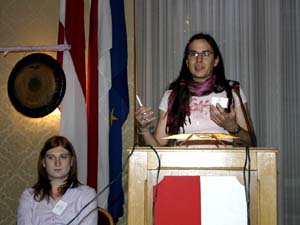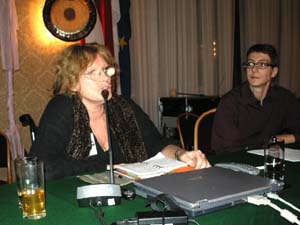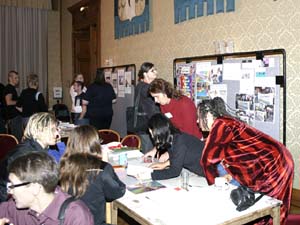Trans People in Europe:Comparsion of laws and jurisdiction (11:00
- 11:30)
|
| A comparative examination of the legal, medical and social issues affecting trans people. This will include:
Download
|
Transgender related laws and judgement in European countries (11:30
- 12:00)
Simona Vivaldo / transeuropean.org (I)
|
Europe is a group of countries some of them completely independent and some of them joint in a federation, better known as European Union. All of them have their own ruling system, each one different from each other and valid all over their territory. For those countries joint in the EU, part of their national sovereignty is submitted to communitarian lawmaking. That means that some aspects of social and economic life must (or should) comply to communitarian decisions. At present few is done at European level about transsexualism and each country faces with it according with their traditions, laws and prejudices often generated by religious beliefs. Sex in our world is a very serious taboo and most of the solutions found seems to be adopted only when it was impossible to act otherwise and in order to keep the status quo hiding the phenomenon rather then helping transsexual people for a complete fulfilment of their being. About that, the Italian sex change law (L. 164/82) is noteworthy because in it who are the receivers of the law is never mentioned. In all cases, to change sex, there are explicit or implicit conditions that burden more or less heavily on personal life, family and human or civil rights. Once more it is to be remembered that all solutions are adopted to preserve the status quo. The main life aspects affected by transsexualism and sex change could be summarized in: sex, name, family life, documents. Download
|
Break (12:00-14:00)
Lunch, 12:00-14:00
|
Bureau, 12:00-14:00
|
Short presentations (14:00-16:30)
Transsexuality in Spain: Close to
legal solutions
Àlec Casanova / GIGT (E)
| Since 1983 the sex change is no longer punished by law in Spain. But all the medical care and legal burocracy transsexual people need to undergo to get our registered name and sex changed, have not been ruled yet. The legal situation is due to be regulated on the next months with the „Ley de Identidad de Género“ (Gender Identity Law). Until now, 2005, transsexual people had to go to court demanding sex and name change on our birth certificates. On these trials we are obliged to undergo a medical examination, which is inhuman. On top of this, judges have the last word on our identity. Thus if anyone has a conservative judge on the trial we are quite sure we won’t get the name and sex change on our birth certificates. When the Gender Identity Law becomes a reality, transsexual people will only need the certificate of a psychologist and the endocrinologist who are attending us to be able to change our registered name and sex on our birth certificate. Download
|
First law on transsexuality in Belgium: a bridge too far?
Joz Motmans / GAG (B)
| In 2004, 4 Belgian politicians submitted a „law proposal about transsexuality“, hereby following European Resolution (12/09/1989) that asked member states to regulate the right of transsexuals on endocrinological, plastic-chirurgical and esthetical gender change, containing the juridical right to change ones first name and to correct the gender on the birth certificate and identity papers. In this limited overview, I will present the „life course“ of this proposal, the main (political) actors who were involved, the mayor objections formulated by TG-groups, and the current state of affairs. Since the debate is still goign on, there are no definite results yet, but interesting observations on (non-)cooperation could be made. Download
|
Mediterranean Sun and Sea is not always pretty to see
Jo Bernardo / a.trans (P)
| Transgenderism is a widely unknown reality in Portugal. There are no statistics concerning the transgender population, and investigation in this field is limited by the difficulties in accessing individuals that lack support from the law and are stigmatised by society in general. There are many false beliefs attributed to transgenderism, like for example that all transgender people are sex workers or have some other type of night life activity. There are no specific laws in the country regarding transgenderism or transexualism, only a few court sentences that serve as references about the later and that are sometimes contradictory. Besides, transgender persons were until the last 10 years socially not well seen, and were very often, disregarded as well as discriminated. Many Trans people have in the last years contribute for changing the mainstream idea about the transgender community due to the visibility and recognition in their professions like Human rights activists, Models, Medicine Doctors, Lawyers or Journalists. Download
|
Transphobia in Russia
Brian Dark / LGBT center together (RUS)
| Unfortunately, there are few transgender specialists in Russia. They work only in big cities, such as Moscow, St. Petersburg, Novosibirsk, Chelyabinsk. They say there are some transgender specialists in Rostov-Na-Donu, but anyway the situation is far from perfect. Doctors (psychiatrists) often don’t see the difference between transgender inclination and schizophrenia . They mix up self-idendification with sexual orientation. There is no fixed document in Russian legislation, which lets a determine sequence of changing the documents simultaneously or before changing the sex. Few people can change documents before the operation. The transgender problem is considered to be a completely medical one. That means that only doctors deal with transgenders, but there is no social support for them. Transgender people often face homophobia and transphobia, especially in small towns. Transgender people are often abused, insulted and raped. However, victims seldom go to the police. There are cases, when transgender persons went to the police, but they were refused any help, because there is also great homophobia among policemen. In the media this topic has scandalous and marginal trace, most „normal people“ think that transgenders are prostitutes or people, lost for the society. We would like to find new friends among foreign transgender people, to learn their experience with homophobia and transphobia and their adaptation after the change of the sex. We are interested in everything connected with the life of transgender people abroad. Download
|
Young Transgenders: Between discrimination and (in)visibility?
Julia Ehrt / Inbetween (D) & Emma Persky / TransYouth (GB)
| First we will introduce ourselves and our project. After that we will portrait the legal and social situation of young transgenders in Germany with the focus on Berlin where the situation is very different to the one in the rest of the country. Then we will speak about the special needs of young transgenders from the perspective of the work in our project. Here we will differentiate into needs in the transgender scene and needs in the help for young people (e.g. youth welfare, youth work). We will close our spotlight with a hypothesis about how the definition of trans identities among young transgenders has changed over the last decade. Download
|
Transition in Job
Maria Gigliola Toniollo / CGIL (I)
| Referring to the work field the difficulties for transgender people are really many: for a transgender person it is very difficult to find work because in most countries the law let change the name and the gender on the documents only after the surgical intervention. For who wants to change the image and life having already a work, things are also difficult, cause the prejudice and the ignorance of people. Normally the most difficult thing is the relationship with colleagues, much more than with bosses, but law would give some guaranties, even if many times it is impossible to struggle against mobbing and bad stereotypes. Download
|
Open Forum: Groups Presentations (17:00-19:00)
| The participating groups were invited to present themselves, their activities and aims. Lambda Istenbul (TR) informed about the discrimination against MtF Transsexual Women in Turkey. Press for Chanbe (GB), TransX (A), Gruppo Luna of Turin (I) and GIGT (E) documented their work and haded out informational literature. Furthermore some discussion tables were organised by participants. Peter Newman (Dk) invited to an artist meeting: "Trans-gender-blender-bender-artists-of-all-genders". FeMigra (A) took the initiative to engage in transgender and asylum right. Some people organised a group to talk about the needs of transgender youth. The three discussion groups continued on Sunday and constituted own working-groups. Download
|
Saturday, 5th November: Going forward -> Finding common demands |
More information hopefully coming soon
Transgender movement and strategies: Panel discussion (09:00 - 11:00)
Alex Moro (Gruppo Luna / I), Armand Hotimsky (Caritig / F),
Eva Fels (TransX / A), Jannik Franzen (Transgender Net Berlin / D)
Chair: Justus Eisfeld (T-Image / NL)
Building blocks of our network (11:30 - 12:00)
Jo (TransX / A), Eva Fels (TransX / A)
Working groups: Formulating goals and demands (13:30 - 16:00)
* Acceptance in the society * Anti discrimination * Civil Status * Medical Treatment
* Right of Name * Transition in Job * Self determination in the transition process *
* Trans Artists * Trans Asylum *
Presentation of the working group results (16:30 - 17:30)
For more information see the ![]() Working Groups pages
Working Groups pages
Voting (17:30 - 18:00)
For more information see the ![]() Voting page
Voting page
TransMission - TransX 10th anniversary party (20:00 - 04:00)
*** Stars ***
![]() Patrick Califia talked on "The Politics of Transgenderism"
Patrick Califia talked on "The Politics of Transgenderism"
![]() The famous Kingz of Berlin presented their great show
The famous Kingz of Berlin presented their great show
![]() The wonderful Lucy McEvil did sing for us
The wonderful Lucy McEvil did sing for us
Sunday, 6th November: Outlook, plans and public presentation |
More information hopefully coming soon
Proclamation of the voting results (12:30 - 13:00)
For more information see the ![]() Voting page
Voting page
Panel: Outlook and plans (13:00 - 14:00)
A steering committee was established and given mandate to continue the work for transgender rights on a European level in the future. The steering committee consists of 24 representatives.
It was suggested that the next European Transgender Council takes place in 2007, probably in Copenhagen. Until then, the steering committee will work on contents as well as establish the organisational framework of the European TransGender Network and of the steering committee itself. An important function also will be to look for funding and partners. Furthermore, it was agreed that an informal meeting of the steering committee before the second European Transgender Council will take place in London in 2006.
Public presentation (14:30 - 15:30)
Results and vistas of the First European TransGender Council.

